|
|
Contextual Learning Portal STEM Learning Gardens
Basics- Project TitleSTEM Learning Gardens
- MA Curriculum FrameworksScience / Technology (draft revised standards)
- School ContactMartha Cohn
- School / DistrictLowell Public Schools
- Brief DescriptionThe project will result in the development and implementation of a standards based curriculum unit that will be aligned to the learning gardens located in middle schools across the district. As we address the new skills and practices as presented by the revised Massachusetts State Science and Engineering Standards, we will incorporate hands-on, minds-on lessons and activities. Our team will include members from Lowell Public Schools both in school and out of school, Mill City Grows, Middlesex Community College, and UMASS Lowell UTEACH students. The focus of the work will be to develop a curriculum that includes students in an active role of STEM based learning and stewardship.
- PartnersMill City Grows (MCG) a non-profit organization, that fosters food justice in Lowell. MCG work to create urban food production sites, such as our school gardens, and they provide Lowell residents knowledge to grow their own food or to purchase locally grown food! MCG not only helps implement our gardens but they also provides support, training and advice to both our teaches and support staff at each school. MCG provide staff from Food Corp and Project Bread that bring healthy food directly to our students and families in the way of free farmers markets. In addition, they conduct classroom-connected lessons that incorporate science, math and social studies as well as lessons on food preparation.
UMASS Lowell UTEACH: is a practice-oriented teacher preparation program with a focus on inquiry-based and project-based instruction.
Middlesex Community College, Community Partnership: A Taste of Justice: Fair Trade, Science Education, By Michael Cermak, Assistant Professor of Sociology - Communicating About Our Projecthttp://www.millcitygrows.org/educationalprograms/garden-coordinator-institute/
-
Web Link: » Garden Coordinator Institute Mill City Grows View/Download File: PD Summer Course "Raising STEM Standards in the Learning Garden" - Photo and Caption 1Stoklosa Middle School Garden, Robinson Middle School Garden, Bartlett K-8 School, Rogers STEM PreK-2 School
-
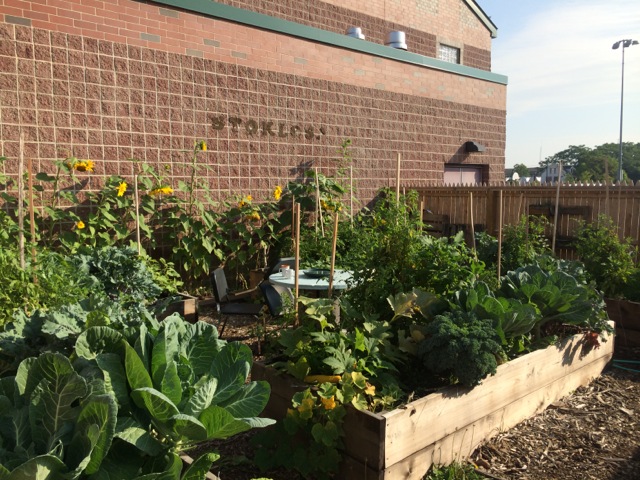 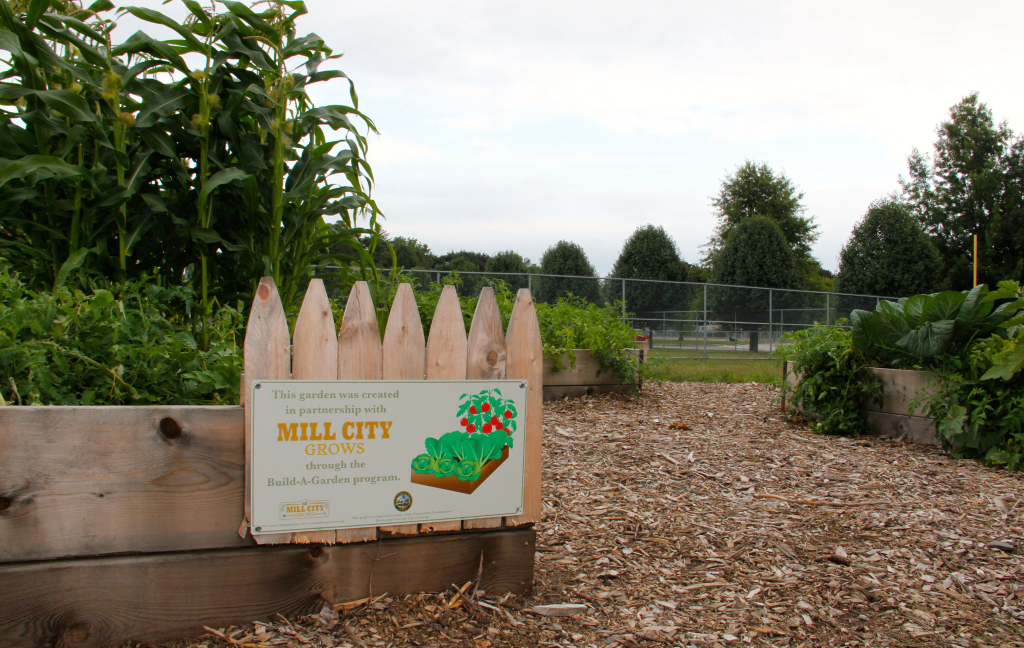 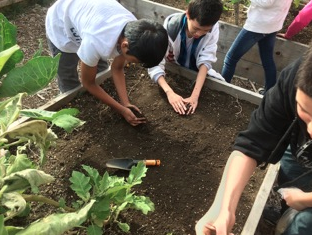 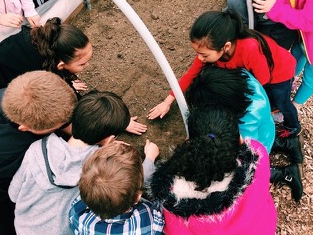 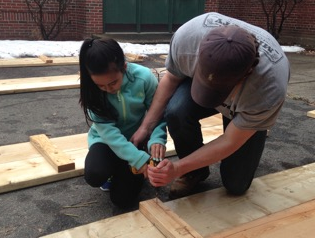
- Photo and Caption 2Project Bread, Nick and Food Corp, Chris conduct classroom lessons around food and healthy eating
-
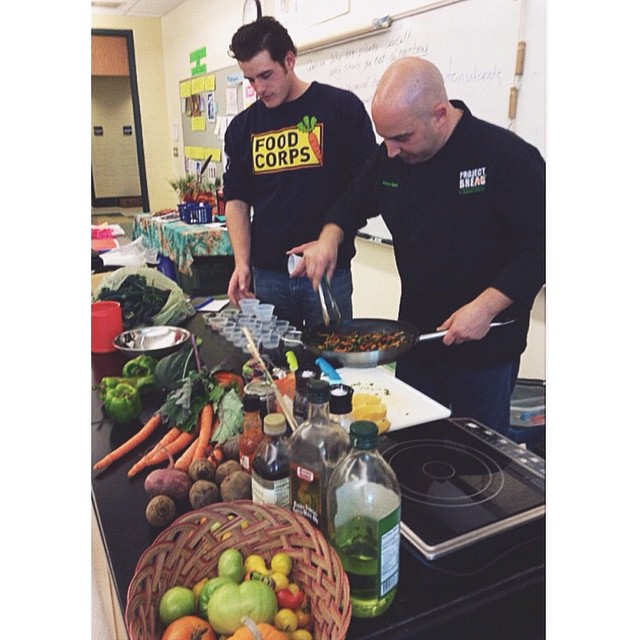 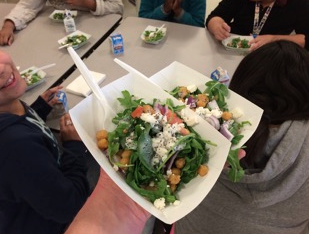 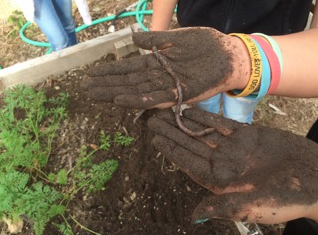
- Photo and Caption 3Wang Middle School Garden Building
-
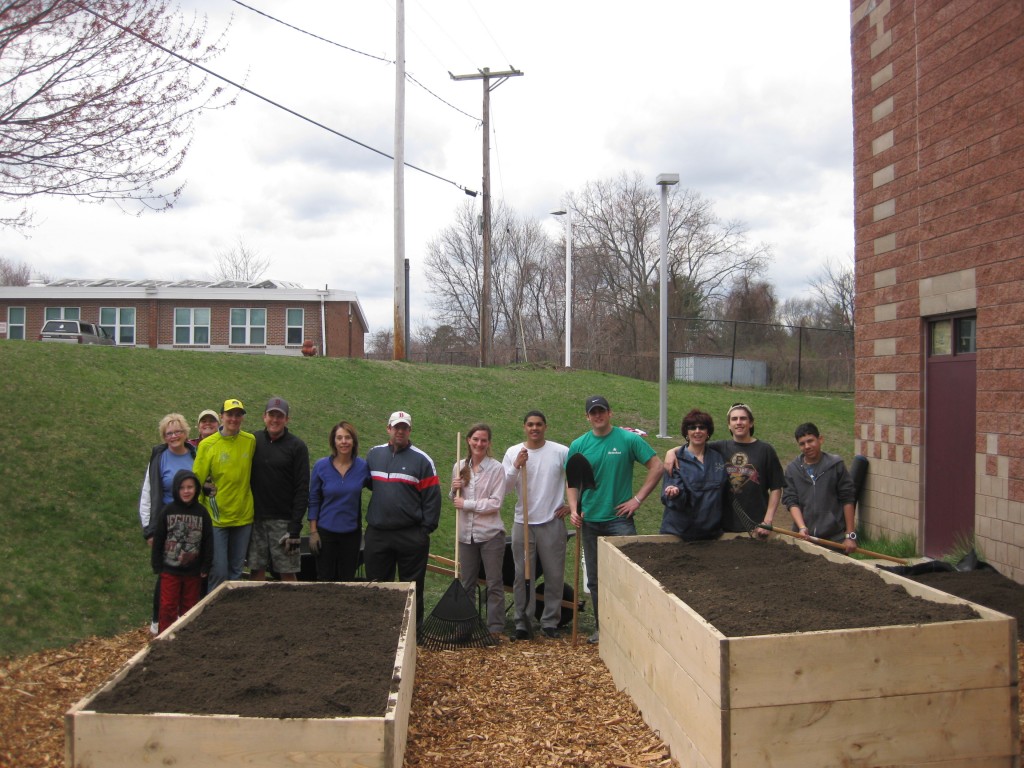
Key Questions- Essential QuestionsHow are animals and plants dependent on one another?
Why is soil quality so important?
Why is water quality so important?
How is energy transferred between objects and converted into different forms?
What does energy do?
Where does energy come from and where does it go? - Connections: How or why was this topic identified? Why is it meaningful?The revised Massachusetts State Science and Engineering Standards are geared more towards environmental impact and human interaction. The learning gardens provide a resource for teachers and students to have a place to explore, observe and test literally outside their door. We want our students to become stewards of the garden so their expertise is valued. We have developed 4 units of study that incorporate the garden into each grade level from 5-8, each building on the other yet independently taught.
- Background Research: What resources were used to find background information for this project?Massachusetts revised State Standards, Delta Education, ABC‘s of Ecology, The Huntington Botanical Gardens, The Growing Classroom, Lawrence Hall of Science, Boston Public Schools, PBS.org
- Outcomes: What was the outcome? How was it shared or applied in the community?So far the existing school gardens have shared the outputs of the garden through school-wide tasting events, donations to area food bank/pantry, community potlucks. Lowell has received a USDA grant that will help support the existing community school gardens and outreach. Lowell also received a MMSP grant that will provide 3 years of professional development for educators in conjunction with Fitchburg State University and other education partners centered around the them of a Learning STEM Garden.
- Family: Any opportunities to involve parent/guardians and other family members in this project?Parent and community volunteers will help in garden construction as well as maintenance. We will train garden leaders to join the leadership team and they will attend the the free Garden Coordinator Institute facilitated by Mill City Grows.
Units / Activities - Grade 5: Food Web
The Grade 5 unit focuses on Food Webs and the relationships between plants and animals. The Grade 5 Unit document contains, the standards, the disciplinary ore ideas, lessons, links, mathematics and ELA common core standards, assessments, discussion questions and career connections.
-
View/Download File: Grade 5 Unit: Food Web - Grade 5 Activities and Resources as listed on the unit documentLessons in PDF format as well as informational text in addition to the resources included in the lesson document.Leveled informational text articles to support topic development
-
View/Download File: Food Chain Game View/Download File: Community and Habitat Lesson View/Download File: Marine Ecosystems L810 View/Download File: Marine Ecosystems L1010 - Grade 6: SoilThe Grade 6 unit focuses on Soil and its relationship to plants and animals as it builds on the grade 5 unit on food webs.The Grade 6 Unit document contains, the standards, the disciplinary ore ideas, lessons, links, mathematics and ELA common core standards, assessments, discussion questions and career connections.
-
View/Download File: Grade 6 Unit: Soil - Grade 6 Activities and Resources as listed on the unit document
Lessons in PDF format as well as informational text in addition to the resources included in the lesson document.Leveled informational text articles to support topic development.
-
View/Download File: Do the Rot Thing View/Download File: Salty Soil L880 View/Download File: Salty Soil L1150 - Grade 7: WaterThe Grade 7 unit focuses on water and its relationship to plants, animals, soil and habitats building on the grade 5 and 6 units.The Grade 7 Unit document contains, the standards, the disciplinary ore ideas, lessons, links, mathematics and ELA common core standards, assessments, discussion questions and career connections.
-
View/Download File: Grade 7 Unit: Water - Grade 7 Activities and Resources as listed on the unit documentLessons in PDF format as well as informational text in addition to the resources included in the lesson document.Leveled informational text articles to support topic development.
-
View/Download File: Water Treatment View/Download File: How Much water L740 View/Download File: How Much Water L1040 View/Download File: How Much Water L1190 - Grade 8: EnergyThe Grade 8 Unit focuses on energy, where it comes from and what it does for plants, animals and the habitats that students have studied in grades 5-7.The Grade 8 Unit document contains, the standards, the disciplinary ore ideas, lessons, links, mathematics and ELA common core standards, assessments, discussion questions and career connections.
-
View/Download File: Grade 8 Unit: Energy
Instructional Techniques - Arguments based on scientific evidenceArguments based on evidence is essential for clarifying strengths and weaknesses and for identifying the best explanation. Scientists must defend their explanations, formulate evidence based on a solid foundation of data, examine their understanding in light of the evidence and comments by others, and collaborate with peers in searching for the best explanation.
-
View/Download File: Skills and Practices from Revised Science and Technology Standards - Presentation A major practice of science is to communicate ideas and the results of inquiry, both orally and in writing. Students should use tables, diagrams, graphs and equations to present their thinking and further their knowledge by engaging in extended discussions and questioning with peers.
- ModelingThe use of models and simulations help develop explanations and uncover misconceptions. Models enable predictions in the form “if...then... therefore” to be made in order to test hypothetical expla- nations. Building on these models is a strategy for teaching and learning.
- Science Notebooks/JournalsThese are essential to document evidence, organize data, document observations, record questions, and provide models. Science notebooks allow students to reflect and build upon their knowledge.
Assessment Techniques
Subject = ELA, Mathematics, Science, Service_Learning | Grade Level = MS | Time Period = School Year | Program/Funding = | 189 |
Direct website link to this project: http://ContextualLearningPortal.org/contextual.asp?projectnumber=482.6358
|









